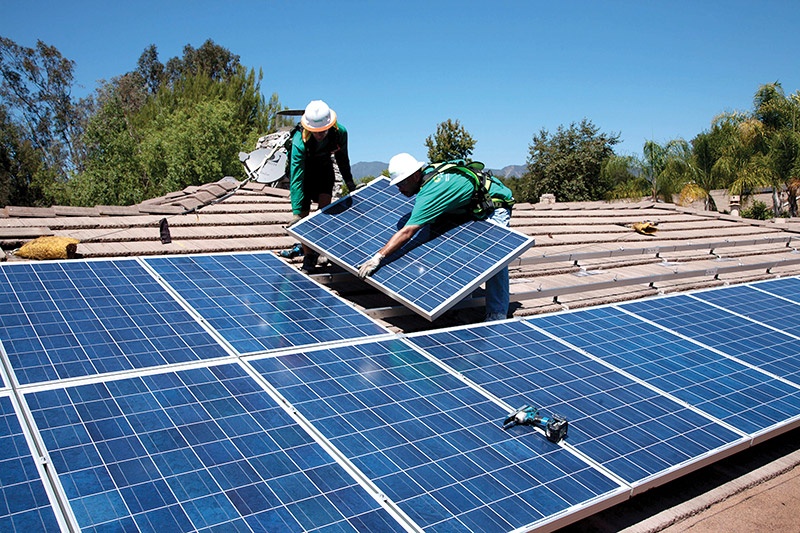Domestic solar panel groups remain overshadowed
 |
| Companies continue to develop new solar tech, but Chinese groups currently crowd the market. Photo: Shutterstock |
IREX, a member of SolarBK Group, has signed a partnership with TP Bank in an attempt to penetrate the US market with solar panel products. Under the deal, TP Bank will support IREX’s production as well as solar projects and export activities from Vietnam. The total fund is expected to be VND200 billion ($8.9 million).
“This is a milestone that helps us increase production and back up finance in the context of increasing demands and commitments of governments towards net-zero greenhouse gas emissions set by COP 26 in Glasgow last November,” said Nguyen Thuy Ngan, brand director of locally-invested Solar BK.
The US government in June approved a 24-month tariff exemption for solar panels from the four Southeast Asian countries of Vietnam, Cambodia, Malaysia, and Thailand so as to meet national renewable electricity demand.
In recent months, the US Commerce Department has been investigating whether imports of solar panels from the four nations are circumventing tariffs on goods made in China. Solar panel imports from these countries had been frozen, which delayed solar projects within the US.
US President Joe Biden’s declaration of a 24-month tariff exemption effectively puts an end to the freeze. It also means that companies do not have to worry about paying tariffs on panels imported during those 24 months at a later date, according to US group Kanban Logistics.
That would be a game changer for some as, according to Reuters, retroactive tariffs associated with the investigation could have been as high as 250 per cent.
Depending on the investigation’s outcome, tariffs could be re-implemented after the 24-month period. But, for the next two years, companies are free to import solar panels from Southeast Asia without fear of tariffs.
But there are barely any domestic businesses around to produce solar items and take advantage of the freeze.
Nguyen Thuy Ngan, brand director of locally-invested Solar BK, told VIR, “Solar BK is the only domestic enterprise producing solar cells and panels, and accounts for less than 1 per cent of the market share in Vietnam. Domestic goods face great competition from cheap Chinese goods.”
Ngan explained that although Vietnam has policies to promote renewable energy, there are none to aid solar panel producers. Therefore, Chinese businesses have long held the tightest grasp on the home market, which is worth billions of US dollars.
Vietnam’s solar panel market is dominated by foreign investors of Trina Solar and JA Solar Group, both Chinese businesses. Meanwhile, US-invested First Solar has invested in facilities in Vietnam with an annual production capacity of up to 2.7GW.
The battle for the market share of solar cell manufacturers has become hotter and not only for the US market, as foreign-invested solar panel firms are eager to update new products to increase the efficiency of their products.
Trina Solar this month announced that it had reached 24.5 per cent efficiency with a version of its PERC solar cell, breaking the world record for the 24th time. “We are proud to announce these latest achievements by our technical team,” said Dr. Yifeng Chen, head of the high-efficiency cell and module research and development centre at Trina Solar. “PERC cells are a very mature industrial technology with a lower cost.”
Meanwhile, JA Solar earlier this year announced it would expand its investment in Vietnam by developing 2.5GW in Vietnam’s Bac Giang province, in the form of wafer slicing capacity. The $189 million expansion scheme, through the company’s wholly-owned subsidiary JA Solar Vietnam, is expected to come online next year.
JA Solar boasts 12 manufacturing bases and more than 20 branches around the world, with the business covering silicon wafers, cells, modules, and photovoltaic (PV) power stations.
Ngan from SolarBK said that PV/cell solar electricity has played a significant role in advancing carbon neutrality since it is one of the most adaptable and affordable sources of renewable energy. “However, Vietnam should take caution when exporting solar panel cells in order to avoid anti-dumping measures, with the market dominated by Chinese suppliers,” Ngan added.
What the stars mean:
★ Poor ★ ★ Promising ★★★ Good ★★★★ Very good ★★★★★ Exceptional
Themes: Sustainable Energy
- 16th national conference on nuclear science and technology opens in Danang
- Technology and Energy Forum 2023 to open in Quang Ninh
- Asia Clean Capital Vietnam receives backing from Swiss Investment Manager
- Amazon scales renewable energy to fight climate change
- Universal Alloy Corporation Vietnam partners with Asia Clean Capital Vietnam
Related Contents
Latest News
More News
- Trung Nam-Sideros River consortium wins bid for LNG venture (January 30, 2026 | 11:16)
- Vietnam moves towards market-based fuel management with E10 rollout (January 30, 2026 | 11:10)
- Envision Energy, REE Group partner on 128MW wind projects (January 30, 2026 | 10:58)
- Vingroup consults on carbon credits for electric vehicle charging network (January 28, 2026 | 11:04)
- Bac Ai Pumped Storage Hydropower Plant to enter peak construction phase (January 27, 2026 | 08:00)
- ASEAN could scale up sustainable aviation fuel by 2050 (January 24, 2026 | 10:19)
- 64,000 hectares of sea allocated for offshore wind surveys (January 22, 2026 | 20:23)
- EVN secures financing for Quang Trach II LNG power plant (January 17, 2026 | 15:55)
- PC1 teams up with DENZAI on regional wind projects (January 16, 2026 | 21:18)
- Innovation and ESG practices drive green transition in the digital era (January 16, 2026 | 16:51)

 Tag:
Tag:




















 Mobile Version
Mobile Version